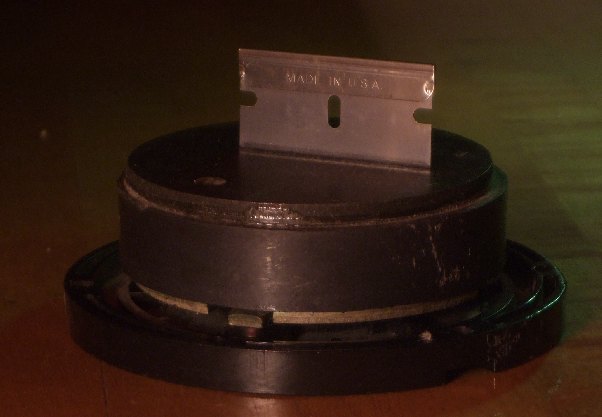Friday 27 Apr 2012 comment?
|
In 1980 I lived in New York City and I rode my bike all over at any
time of day and in any condition (I refer to the condition of the rider;
the bike was in good shape). I had a friend who lived on Christopher
Street who let me use his apartment as bicycle parking when I went
to the west village for nights out. I don't think I fully appreciated
at the time how generous that was of him. His work sent him to Dubai and
he offered me a job there and I turned it down because I was 21 years
old and couldn't see living in a country where gay sex was illegal.
He was also the friend who turned me on to one of my favorite bands, The Monochrome Set. For me, their music is entwined with all the other memories I have of being 21 and living in New York City (although I also like a lot of the music they made after I had moved to the West). And I will remember April 2012 as when The Monochrome Set released their first record since 1995. It is not sold by download but rather on CD, which is fine with oldsters like me who still like having physical media and packaging, and seems wholly appropriate for a band whose lead guitarist's style is described, aptly, by Wikipedia as idiosyncratically retrogressive. I have never gotten much traction when I've tried to turn others on to their music, but that will not deter me from saying that Waiting for Alberto—my favorite song on their new CD—is streamable, in full, from the band's web site (see the Flash player app toward the right side of the page). | "The
producers of this record do not propose that this record will answer all the
questions which your child will eventually ask about sex, however, it will
give the basic foundation of knowledge which every responsible parent will
want their child to acquire." - from the back cover of the 1990 CD Dante's Casino; quoted here because I found it nowhere on the web and I wanted anyone who searched for it to find this page. |
Sunday 22 Apr 2012 1 comment
While I was working in Colorado, I had lunch every Monday with a few engineers I knew. We talked more about politics than we did about engineering. I don't have lunch with the group on Mondays anymore but I do get included in some of their email discussions.
After a recent exchange about the sad state of—well, it doesn't really matter what—one of them wrote,
It all reminds me of a line from Nietzsche:
While I was working in Colorado, I had lunch every Monday with a few engineers I knew. We talked more about politics than we did about engineering. I don't have lunch with the group on Mondays anymore but I do get included in some of their email discussions.
After a recent exchange about the sad state of—well, it doesn't really matter what—one of them wrote,
I would move to New Zealand, but I am stuck because of the kids.I don't think he would do it. Or: if he didn't have kids, he'd find another excuse. I say this as someone who has, on occasion, been fed up enough with US politics to have said I was tempted to leave. Not having kids, I had a different excuse.
It all reminds me of a line from Nietzsche:
The thought of suicide is a powerful solace: by means of it one gets through many a bad night.
Sunday 15 Apr 2012 comment?
I didn't get to visit the Rohloff factory back in 2002 because they were closed for vacation at the time I was visiting friends in Germany. I wanted to visit Rohloff because I like how they brought an innovative product to market, built it as well as they knew how to, and didn't follow prevailing fashion in their industry.
Their product is an internally-geared bicycle hub, the bicycle-industry fashion they didn't follow is light weight at the expense of durability, and can I also say I like it because it's available in red?
I'd also love to visit the Fazioli factory in Italy. They are an upstart piano maker that has pioneered innovations that a number of pianists think make a real difference in the sound. My hat is totally off to Mr. Fazioli for his vision and for his openness. He takes pride in pointing out the features of his pianos--with the refrain "nobody else does this"--yet he chose not to get all the patents he could:
Since I made my marimba, I've thought of a design change, something no one else is doing, that I think might make for a better instrument. Maybe some day I'll make some experiments, not that I want to get into the marimba business (the market is thin; not a lot of people play marimba).
I didn't get to visit the Rohloff factory back in 2002 because they were closed for vacation at the time I was visiting friends in Germany. I wanted to visit Rohloff because I like how they brought an innovative product to market, built it as well as they knew how to, and didn't follow prevailing fashion in their industry.
Their product is an internally-geared bicycle hub, the bicycle-industry fashion they didn't follow is light weight at the expense of durability, and can I also say I like it because it's available in red?
I'd also love to visit the Fazioli factory in Italy. They are an upstart piano maker that has pioneered innovations that a number of pianists think make a real difference in the sound. My hat is totally off to Mr. Fazioli for his vision and for his openness. He takes pride in pointing out the features of his pianos--with the refrain "nobody else does this"--yet he chose not to get all the patents he could:
"To patent costs a lot of money and it is absolutely not important. People who want to copy, copy."It's also nice to see spirited competition in an industry long dominated by one player—Steinway—that's known for being less than gracious to artists who don't want to play their piano exclusively.
Since I made my marimba, I've thought of a design change, something no one else is doing, that I think might make for a better instrument. Maybe some day I'll make some experiments, not that I want to get into the marimba business (the market is thin; not a lot of people play marimba).
Tuesday 10 Apr 2012 6 comments
Today, a puzzle.
100 prisoners' names are written on slips of paper and placed randomly into 100 boxes. That is, each box contains one piece of paper with the name of one of the prisoners. The boxes are placed in a row on a table in a room.
The 100 prisoners are told they will be let into the room one at a time and each prisoner will be allowed to look into 50 of the 100 boxes. He gets to choose which 50 boxes to look into. The goal is for each prisoner to find the box that contains his name.
Prisoners may agree on a strategy in advance, but each prisoner must search for his name alone. No prisoner-to-prisoner communication is permitted once the searching starts.
As an incentive, the prisoners are told that if they all succeed in finding their names, they will all be released; otherwise they will all be executed. (This is hardly the first time a logic puzzle has used a prison/death theme for dramatic effect.)
No matter what strategy is chosen for the group, the first prisoner has a 50‑50 chance of finding his own name. This follows from the names being placed in boxes at random and the prisoners having no hints as to how it was done.
With no strategy—i.e. if all 100 prisoners choose boxes randomly and independently—they would be, for all practical purposes, doomed. The probability that they'd all find their own names would be ½100, or .00000000000000000000000000000078886... .
The question is, how good a joint strategy is possible? With an optimal strategy agreed on in advance of the searching, what is the probability of all prisoners finding their own name?
Other versions of this puzzle tell you what probability is possible with a good strategy and ask you describe what the strategy is. I thought it'd be fun to not give away what success rate is possible and to see what people estimated. But feel free to describe a strategy if one occurs to you.
Today, a puzzle.
100 prisoners' names are written on slips of paper and placed randomly into 100 boxes. That is, each box contains one piece of paper with the name of one of the prisoners. The boxes are placed in a row on a table in a room.
The 100 prisoners are told they will be let into the room one at a time and each prisoner will be allowed to look into 50 of the 100 boxes. He gets to choose which 50 boxes to look into. The goal is for each prisoner to find the box that contains his name.
Prisoners may agree on a strategy in advance, but each prisoner must search for his name alone. No prisoner-to-prisoner communication is permitted once the searching starts.
As an incentive, the prisoners are told that if they all succeed in finding their names, they will all be released; otherwise they will all be executed. (This is hardly the first time a logic puzzle has used a prison/death theme for dramatic effect.)
No matter what strategy is chosen for the group, the first prisoner has a 50‑50 chance of finding his own name. This follows from the names being placed in boxes at random and the prisoners having no hints as to how it was done.
With no strategy—i.e. if all 100 prisoners choose boxes randomly and independently—they would be, for all practical purposes, doomed. The probability that they'd all find their own names would be ½100, or .00000000000000000000000000000078886... .
The question is, how good a joint strategy is possible? With an optimal strategy agreed on in advance of the searching, what is the probability of all prisoners finding their own name?
Other versions of this puzzle tell you what probability is possible with a good strategy and ask you describe what the strategy is. I thought it'd be fun to not give away what success rate is possible and to see what people estimated. But feel free to describe a strategy if one occurs to you.
Tuesday 03 Apr 2012 comment?
earlier today--
earlier today--
| Tommy: | Why are my arms so sore. I was in OK shape when we last climbed three weeks ago. |
| climbing buddy: | At our age you can lose conditioning that quickly. |
| Tommy: | I've noticed that. But I still feign surprise when it happens. |
Sunday 01 Apr 2012 comment?
I took a journalism class one semester in high school. It seemed like all the newspapers the teacher ever named in class were ones he said were good, if perhaps different in their intended purposes. When I asked one day if he could give an example of a second-rate newspaper, he named the Long Island Press.
There are many things I could say about the Long Island Press, but I'll just mention that it carried Heloise, a syndicated household advice column which—in an installment that made a lasting impression on me—said to put your plastic plants in the shower to rinse dust off of them.
The Long Island Press went out of business a year after I graduated from high school, after having published for 156 years.
Heloise, on the other hand, is still kicking. From her web site, a sample tip about textbooks: "If you buy used, look for ones in good shape and with not much underlining or highlighting. You do not know if the person, who did the markings was smart or not!"
Anyhow. This has been a roundabout way to introduce the first in a series of Tommyjournal household hints postings.
You already know that single-edge razor blades have all kinds of uses. But how to keep them handy, so you can easily grab one from the not-so-sharp side? Well, they stand on their edge on the backs of speaker magnets! Next time you blow up a tweeter or just upgrade your speakers, you've got a razor blade stand.

I took a journalism class one semester in high school. It seemed like all the newspapers the teacher ever named in class were ones he said were good, if perhaps different in their intended purposes. When I asked one day if he could give an example of a second-rate newspaper, he named the Long Island Press.
There are many things I could say about the Long Island Press, but I'll just mention that it carried Heloise, a syndicated household advice column which—in an installment that made a lasting impression on me—said to put your plastic plants in the shower to rinse dust off of them.
The Long Island Press went out of business a year after I graduated from high school, after having published for 156 years.
Heloise, on the other hand, is still kicking. From her web site, a sample tip about textbooks: "If you buy used, look for ones in good shape and with not much underlining or highlighting. You do not know if the person, who did the markings was smart or not!"
Anyhow. This has been a roundabout way to introduce the first in a series of Tommyjournal household hints postings.
You already know that single-edge razor blades have all kinds of uses. But how to keep them handy, so you can easily grab one from the not-so-sharp side? Well, they stand on their edge on the backs of speaker magnets! Next time you blow up a tweeter or just upgrade your speakers, you've got a razor blade stand.

current journal
FAQ
contact
rss/xml
atom/xml
spam notice
archive
FAQ
contact
rss/xml
atom/xml
spam notice
archive
| jan | feb | mar |
| apr | may | jun |
| jul | aug | sep |
| oct | nov | dec |
| jan | feb | mar |
| apr | may | jun |
| jul | aug | sep |
| oct | nov | dec |
| jan | feb | mar |
| apr | may | jun |
| jul | aug | sep |
| oct | nov | dec |
| jan | feb | mar |
| apr | may | jun |
| jul | aug | sep |
| oct | nov | dec |
| jan | feb | mar |
| apr | may | jun |
| jul | aug | sep |
| oct | nov | dec |
| jan | feb | mar |
| apr | may | jun |
| jul | aug | sep |
| oct | nov | dec |
| jan | feb | mar |
| apr | may | jun |
| jul | aug | sep |
| oct | nov | dec |
| jan | feb | mar |
| apr | may | jun |
| jul | aug | sep |
| oct | nov | dec |
| jan | feb | mar |
| apr | may | jun |
| jul | aug | sep |
| oct | nov | dec |
| jan | feb | mar |
| apr | may | jun |
| jul | aug | sep |
| oct | nov | dec |
| jan | feb | mar |
| apr | may | jun |
| jul | aug | sep |
| oct | nov | dec |
| jan | feb | mar |
| apr | may | jun |
| jul | aug | sep |
| oct | nov | dec |
| jan | feb | mar |
| apr | may | jun |
| jul | aug | sep |
| oct | nov | dec |
| jan | feb | mar |
| apr | may | jun |
| jul | aug | sep |
| oct | nov | dec |
| jan | feb | mar |
| apr | may | jun |
| jul | aug | sep |
| oct | nov | dec |
| jan | feb | mar |
| apr | may | jun |
| jul | aug | sep |
| oct | nov | dec |
| jan | feb | mar |
| apr | may | jun |
| jul | aug | sep |
| oct | nov | dec |
| jan | feb | mar |
| apr | may | jun |
| jul | aug | sep |
| oct | nov | dec |
| jan | feb | mar |
| apr | may | jun |
| jul | aug | sep |
| oct | nov | dec |
| jan | feb | mar |
| apr | may | jun |
| jul | aug | sep |
| oct | nov | dec |
| jan | feb | mar |
| apr | may | jun |
| jul | aug | sep |
| oct | nov | dec |
| jan | feb | mar |
| apr | may | jun |
| jul | aug | sep |
| oct | nov | dec |
| jan | feb | mar |
| apr | may | jun |
| jul | aug | sep |
| oct | nov | dec |



